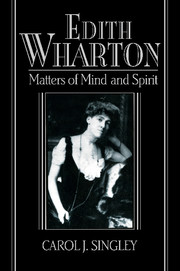2 - Spiritual Homelessness
Published online by Cambridge University Press: 06 August 2010
Summary
You can make a religious woman believe almost anything: there's the habit of credulity to work on. But when a girl's faith in the Deluge has been shaken, it's very hard to inspire her with confidence.
Edith Wharton, “The Quicksand”I wish you felt a little more kindly toward poor Lily!
Edith Wharton, LettersDuring the first quarter-century of evolutionary science, theologians attempted to accommodate Darwin's theory. They envisioned an orderly, progressive development from inferior conditions and morals to superior ones, with no need to dispense with the First Cause; they still attributed Creation to divine intervention (Warren 69). But the truce between faith and science could not last; even the most resistant believers saw traditional faith undermined. If humans were mere matter, could a spiritual life be possible? Was there no foreordained design of the universe? Did evolution suggest a random play of forces rather than divine plan, or, worse, a God who still governed but refused to intervene directly in human affairs? Writers of all religious persuasions tried to answer these questions in their fiction. As Gillian Beer notes, Darwinian theories lent themselves to a variety of interpretations that nineteenth-century novelists both resisted and assimilated. Evolution influenced novels at levels of organization as well as theme, disrupting traditional notions of cause and effect and producing contradictory philosophies of progress or degeneration (8–9).
- Type
- Chapter
- Information
- Edith WhartonMatters of Mind and Spirit, pp. 67 - 88Publisher: Cambridge University PressPrint publication year: 1995



